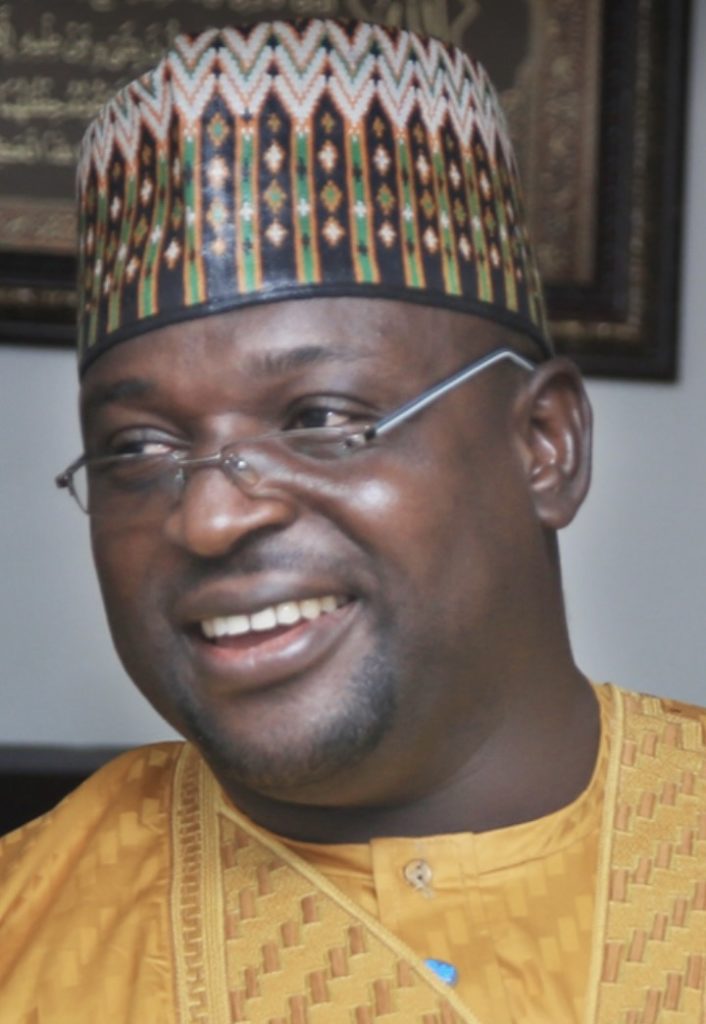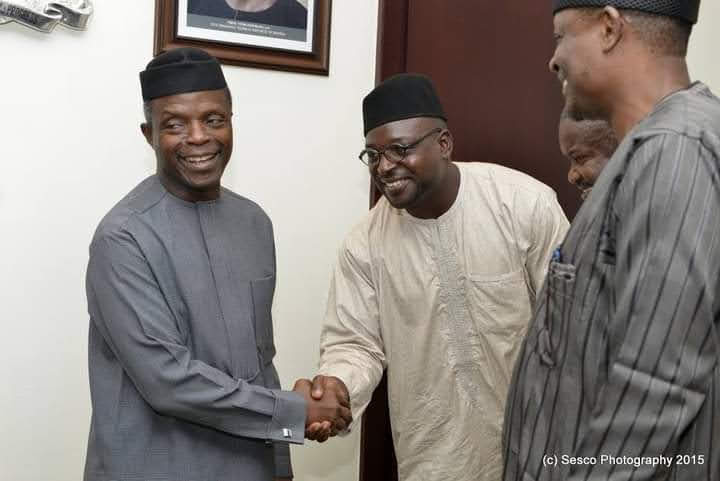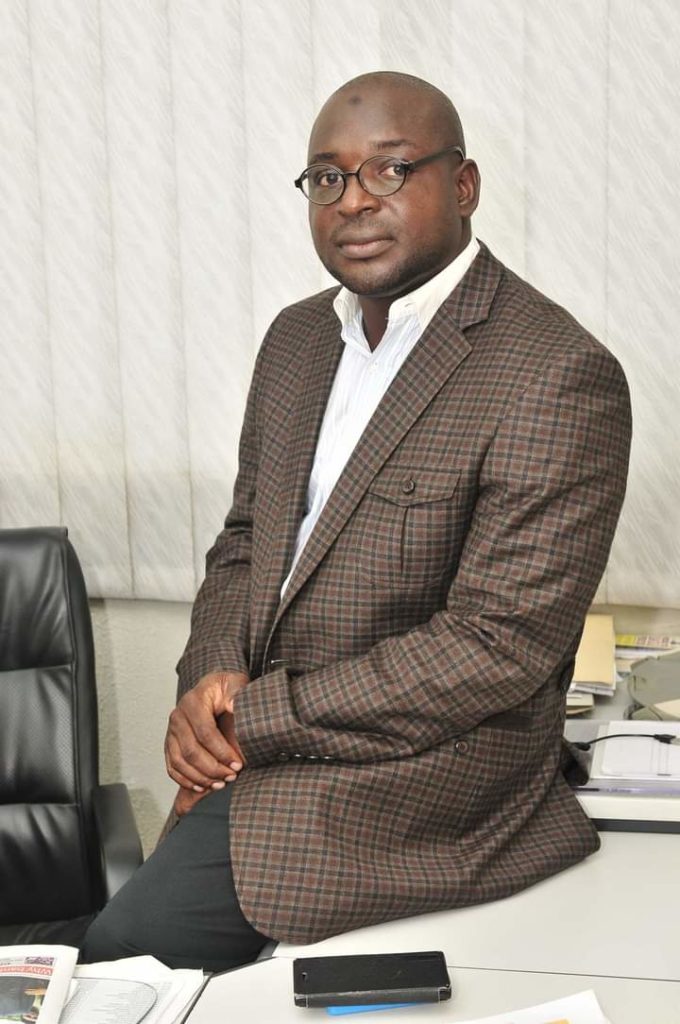Journalist: Mahmoud Mansi
“I wish to advocate for renewed collaboration among African business entrepreneurs with a view to overcoming the myriad of common challenges facing the continent.”
Musa Bashir Usman

About the Interviewee
Musa Bashir Usman is the Founder and Managing Director of the Media Consultancy Company, MBdotCOM, publishers of Valuechain magazine. He obtained his first degree in Economics from Bayero University Kano and MBA from the same University in 2015. Usman started his career as a business reporter at the New Nigeria Newspapers in 2005, where as part of his daily schedule, he covered activities in the oil and gas sector. He later moved to Peugeot Automobile Nigeria Limited as Public Relations Officer in 2007 and rose to become the automobile company’s Head of Corporate Communications in 2012. In 2015, he resigned his appointment with the company to form MBdotCOM Nigeria Limited. The company went into the publication of Valuechain Oil and Gas magazine in July 2018.

(The Value Chain Magazine Link)
The Interview
HR Revolution Middle East: You have been leading one of the biggest Oil and Gas publications in Nigeria and Africa, which makes you a very distinctive researcher and influencer in the industry. How have you been developing yourself to continuously and effectively influence the Oil and Gas Industry?
Musa Bashir Usman: When you think about those who have been the most influential business people such as Bill Gates or Steve Jobs, you might notice that all of them have one common quality that makes them successful. They have a clear vision of what they want to achieve. When we set up Valuechain Oil and Gas magazine four years ago, we had a clear vision to put in so much effort to provide readers with the most reliable and informative reports of the happenings in the energy sector.
In most oil rich African countries, oil and gas are national resources. As such, the resources are a legitimate topic of national debate. However, lack of interest or understanding on the part of the public and a lack of transparency on the part of the industry and government have limited the benefits from this nature given resource to the people. This is where we try to make a difference through our reports to open people’s eyes to what is happening – or to what could or should be happening – and inform debate on the best way forward thereby setting an agenda for development.
We are determined to achieve the vision set for the magazine. At the same time, we have to transfer this way of thinking to each team member. That’s the only way to expect big results in an enterprise. We have a vision to be Africa’s leading media organization in the oil and gas sector.
We supported our vision with a group of clearly determined objectives. We set precise targets in all stages of our editorial work and, also, our staff members are acquainted with our expectations.
When you run a company or manage big projects, you cannot neglect the latest industry trends while managing to change the obsolete ways. I try to always stay updated and learn about the avant-garde ideas and developments in the industry. It is important to hear what key opinion leaders have to say and I try to take positive advantage from that in the quality of stories that we churn out. Similarly, I am not a loner who stays away from other people. I actually make it a duty to grow my professional and industry networks and maintain relations with my peers. This way, I can follow industry trends much easier and also increase the potential to establish new partnerships.
Having said that, I would like to add that genuine leaders work hard. You need to be the first to come to the office and the last one to leave. It’s not easy but that’s the way it is if you want to succeed.

HR Revolution Middle East: With your knowledge in diplomacy and international business, how do you think African countries can collaborate towards developing the continent’s energy sector?
Musa Bashir Usman: There’s need for more collaboration among African countries in order to maximize the continent’s oil and gas potential for the benefit of its citizens. I think African countries can collaborate more than they are currently doing in the areas of finance, human capital, infrastructure development, data sharing, judiciary and security.
I believe that we need to domesticate oil and gas technology in our continent and encourage local content development in our oil and gas industry. At a time that the global energy industry is moving away from fossil fuels, we need to take our destinies into our hands because very soon, we might not have the technology to bring out the crude, and even if we manage to do that, financing new projects is already a big challenge, even right now as we speak.
In Africa, the tough operating and economic conditions, coupled with regulatory uncertainty, political instability and a lack of infrastructure has become a major challenge. One of the critical issues that need to be addressed in order to develop and nurture the continent’s oil and gas industry for economic transformation is the need for African countries to work together, focus more on collaborative measures and strategies that will position the continent to compete globally.
The African Petroleum Producers’ Organization (APPO) needs to be at the forefront in the push for this innovation and collaboration with a key aim of doubling the trade level. I am glad the new Secretary General has hinted that such policies are being considered.
African countries should seek technological advancement and see fellow nations on the continent as partners not competitors. There should be a working synergy between the governments, companies, and host communities. I expect to see a situation where African independent and small E&P companies should have the privilege to bid for oil blocks within the continent, they can even form partnerships to bid for international assets. I also think there should be a uniform local content criteria and guideline across Africa.
As we are beginning to realise, the transition fuel to renewables is gas, therefore more African countries need to focus more on gas production and utilization since we have it abundantly. African countries should form an oil and gas service providers’ association which will serve as a focal point for joint pursuit of objectives that will foster local and regional collaborations.
HR Revolution Middle East: Having an educational background in Economics, what do you believe are the 3 sustainable development goals (SDGs) that Nigeria should be focusing on in the next 5 years?
Musa Bashir Usman: As we all know, the SDGs consist of 17 global goals put together by the United Nations, designed as a “blueprint to achieve a better and more sustainable future for all”. Each of the 17 goals is expected to be achieved by 2030 in every country around the world. In 2017, Nigeria was among 44 member countries of the United Nations that presented their Voluntary National Review (VNR) on the implementation of the 2030 agenda and the SDGs.
To me, the three goals I think that both government and non-governmental organizations or private sector in the country should be doing their best to achieve in the short term are the goals of Education (Goal 4), Affordable and Clean Energy (Goal 7) and Industry, Innovation and Infrastructure (Goal 9).
Goal 4 of the SDGs is to have every child in school and learning by 2030. However, there are still 260 million children worldwide who don’t go to primary or secondary school. A survey conducted by the United Nations Children Fund (UNICEF) indicates that the population of out of school children in Nigeria rose from 10.5 million to 13.2 million, meaning that Nigeria has the highest number of out of school children in the world.
So, I think the federal and state governments should focus on this education problem by expanding budgetary spending on education, which I believe is currently not enough to bridge the widening gap. So far, there appear to be no new policies to boost education spending, hence the implementation of State Universal Basic Education Board’s provision of free Universal Basic Education for every Nigerian child of school going age is necessary.
On Affordable and Clean Energy, we all know that energy plays the most vital role in the economic growth, progress, and development, as well as poverty eradication and security of any nation. Energy fuels productive activities, including agriculture, commerce, manufacturing, industry, and mining. Conversely, a lack of access to energy contributes to poverty and deprivation.
We have abundant hydrocarbon resources estimated at 37 billion barrels of crude oil and 202 trillion cubic feet (tcf) of gas reserves, but it is no longer news that Nigeria has one of the highest energy deficits globally, with about 50% of the population lacking access to electricity and cooking fuels. There is no doubt that the present energy crisis afflicting Nigeria will persist unless the government diversifies the energy sources in domestic, commercial, and industrial sectors and adopts new available technologies to decarbonize its oil, expand gas utilization and embrace renewable energy. A very important point to note here is that we cannot abandon our God-given resource of oil just because we are told to do so. We have to work on developing a technology that will reduce the carbon emissions in fossil oil. That will be in addition to our commitment to developing energy from renewable sources. Don’t forget that according to OPEC’s energy outlook, fossil oils will still form 50 percent of the world energy mix in the next 30 years.
In terms of Goal 9, which is about Industry, Innovation and Infrastructure, you will agree with me that innovation and technological progress are key to finding lasting solutions to both economic and environmental challenges facing Nigeria. Sustained investment in infrastructure and innovation are crucial drivers of economic growth and development. Technological progress is also key to finding lasting solutions to both economic and environmental challenges. According to a recent global survey, more than 4 billion people still do not have access to the internet, and 90 percent are from the developing world. Bridging this digital divide is crucial in ensuring equal access to information and knowledge and, as a consequence, fostering innovation and entrepreneurship.

HR Revolution Middle East: As an experienced entrepreneur and businessman, what is your strategic advice to other organizations working in Nigeria and Africa?
Musa Bashir Usman: I wish to advocate for renewed collaboration among African business entrepreneurs with a view to overcoming the myriad of common challenges facing the continent. Africa continues to face socioeconomic, political, security, and environmental problems as a result of bad leadership. The outbreak of the deadly coronavirus pandemic even made things worse. Threats are looming around environmental degradation and climate change on our farming systems. We are facing a network of criminals, including terrorism. All of these challenges require our collective action to work in concert with each other to pragmatically address them. Today’s realities remind us of the need to continue to forge stronger collaborations among African states in order to address the new challenges.
Collaboration among the countries is pivotal toward actualizing the objective, therefore efforts such as the African Continental Free Trade Agreement (AfCFTA) is what I encourage to be followed through. AfCFTA will offer us the pathway for this desired collaboration and cross-country development. It could unite 1.3 billion Africans, create a $3.4 trillion economic bloc and boost trade within the continent.
HR Revolution Middle East: As a magazine specialized in Human Resources, we are interested in knowing more about how Valuechain develops its journalists and writers in order to have such high quality and innovative content?
Musa Bashir Usman: Digital media has completely transformed news in terms of accessibility, creation and delivery of journalism. Likewise, the journalism skills needed to produce and deliver news have also changed.
Many years ago, people turned to traditional media for news: TV, radio and newspapers were the go-to sources. The shift to digital media therefore has come to mean that for aspiring and working journalists, they need to master a variety of journalism skills.
It’s true that the news media face challenges, particularly around revenue generation, but the idea that journalism is dying is a common misconception.
At Valuechain magazine, we see a lot of opportunities with digital media and therefore we prioritize developing unique skillsets for our journalists and writers.
We ensure that they are upskilled in the use of multiple media platforms that allow them to investigate and tell unique stories. We train them on skills required to publish content online, as well as produce quality and professional visuals leveraging social media. We expose them to the most in-demand skills for journalists and, that way, we are able to produce journalism of the highest standard that earns public trust.
We have a Valuechain Oil & Gas Perspectives (VO&GP) family, which is a community of Valuechain readers passionate about happenings in the Oil and Gas sector. There, members discuss daily developments in the industry through information sharing, thereby voicing out their opinions, experiences and suggestions. We encourage our writers to be active on that platform because of the potential of the platform to serve as reference material, news story source and networking opportunities.
HR Revolution Middle East: When it comes to hiring your journalists and writers, what are the most important technical and personal skills you look for?
Musa Bashir Usman: First of all, because we run a specialized publication, we require our journalists to have basic background knowledge or experience in the oil and gas sector. The most basic is that our journalists are educated at graduate level with a wide range of qualifications and, as with many technical careers, a strong work ethic, a good grasp of science, technology, and engineering is also useful for us. Even though these subject areas are not compulsory, they are essential.
I also expect a prospective employee, whether an intern, entry or experienced professional, to have excellent writing skills, with outstanding grammar and punctuation. The candidate should be proficient at proofreading their own word before submitting.
Journalists often work in a fast-paced, rapidly changing environment, so I require our journalists and writers to stay energetic to keep ahead of the news. Having a passion for current affairs and reporting will drive you throughout your busy days as you do research, conduct interviews, check sources, and follow up on leads. You’ll be tenacious about tracking down stories and facts, and not stopping until you get the job done.
HR Revolution Middle East: As a Mentor, what are your career tips for youths working in the Oil and Gas sector in Nigeria?
Musa Bashir Usman: Well, not sure if I am a mentor (laughter), but my career tips for youths working in the Oil and Gas sector is they should strive to make a difference. There is still a barrier in technology and management of resources that needs to be broken. In the next few years to come, it is our desire to have indigenous oil and gas companies listed on Western stock markets. We want a transformation of the entire energy industry in such a manner that we will be a reference point to the global community. I believe they have what it takes to do it, provided they remain focused, inquisitive, curious and full of desire and thirst to make a difference.
